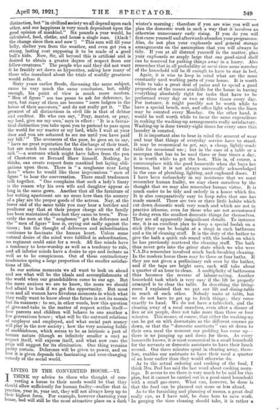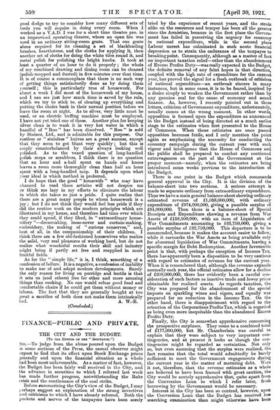LIVING IN THE CONVERTED HOUSE.—VI.
ITHINK my advice to those who thought of con- verting a house to their needs would be that they should allow sufficiently for human frailty—realize that in practice, year in, year out, they will not always keep up to their highest form. For example, however charming your house, bed will still be the most attractive place on a dark winter's morning ; therefore if you are wise you will not plan the domestic work in such a way that it involves an otherwise unnecessary early rising. If you do you will first curse yourself and afterwards abandon your programme. Also, do not plan your cupboards and general storage arrangements on the assumption that you will always be tidy. If you at all distrust yourself in the matter, plan your cupboards so amply large that one good-sized shelf can be reserved for putting things away in a hurry. Also remember that in all probability at some time some member of the household will be ill enough to have to stay in bed. Again, it is wise to keep in mind what are the most constantly used working parts of your house. It is worth while to take a great deal of pains and to spend a good proportion of the means available for the house in having everything absolutely right for tasks that have to be performed every day or two or three times every day. For instance, it might possibly not be worth while to have a special bench, seat, and office light where the linen may be counted every Monday. On the other hand, it would be well worth while to incur the same expenditure in making the washing-up arrangements really satisfactory. Washing-up is done twenty-eight times for every once that laundry is counted.
It is important also to bear in mind the amount of wear and tear that things of everyday service have to stand. It may be economical to get, say, a cheap, lightly-made table for occasional use ; but in the case of a table or a saucepan that has to be used three or four times a day, it is worth while to get the best. This is, of course, a commonplace with the good housewife when she buys her brooms, but it is not always universally acknowledged in the case of plumbing, lighting, and cupboard doors. If I have been melancholy in my insistence that we must remember human frailty, we may cheer ourselves by the thought that we may also remember human virtue. It is much easier to be tidy and orderly in a house which fits. It is also comparatively easy to keep rules that one has made oneself. There are two or three little habits which cut down domestic work very much and which are not in practice irksome, even for those who are not accustomed to doing even the smallest domestic things for themselves. They are all apparently insignificant details. To instance one, it is an excellent plan to keep a special loofah on a stick (they can be bought at a shop) in each bathroom and a tin of cleaning stuff. It is the duty of the bather to give the bath a quick rub round with the loofah on which he has previously scattered the cleaning stuff. The bath thus never gets into the grimy state which we who were V.A.D.s remember involved much back-breaking cleaning.
In the modern house there may be three or four baths. If they are not given a preliminary rub over by the bather, and if the taps are bright ones, each will take about a quarter of an hour to clean. A multiplicity of bathrooms thus becomes the reverse of labour-saving. Another household task which is very easy if the lift be properly arranged is to clear the table. In describing the living- room I explained that we put our lift and dining-table in reach of each other. Nobody waits at table, but we do not have to get up to fetch things ; they come exactly to hand. We do not have a tablecloth, and the clearing away of a meal ourselves, even after a dinner of five or six people, does not take more than three or four minutes. This means, of course, that either the washing-up can be got on with downstairs as the different courses go down, or that the " domestic assistants " can sit down to their own meal the moment our pudding has come up— there is no jumping up and down for them. As every housewife knows, it is most economical in a small household for the servants or domestic assistants to have their lunch second. Our three minutes spent in clearing away, there- fore, enables our assistants to have their meal a quarter of an hour earlier than they would otherwise do. As to the actual ordering and cooking of the food, I think Mrs. Peel has said the last word about cooking morn- ings. It seems to me there is very much to be said for this plan, but it cannot be carried out in a good-sized household with a small gas-stove. What can, however, be done is that the food can be planned out more or less ahead. As to the furnishing and planning of rooms, a great deal really can, as I have said, be done here to save work. In gauging the time cleaning should take, it is rather a good dodge to try to consider how many different sets of tools you will require in doing every room. When I worked as a V.A.D. I was for a short time theatre pro. in an improvised operating theatre, where an open fire was used in an ordinary sitting-room grate. That one grate alone required for its cleaning a set of blackleading brushes, hearthstone, and the cloths for applying it, then another set of cloths for doing the white tiles round it, and metal polish for polishing the bright knobs. It took at least a quarter of an hour to do it properly ; the whole of my combined drawing and dining room can be cleaned (polish-mopped and dusted) in five minutes over that time. It is of course a commonplace that there is no such way of getting things satisfactorily done as by doing them yourself ; this is particularly true of housework. For about a week I did most of the housework of my house, and I can see just how much time is saved by the rule, which we try to stick to, of clearing up everything and putting the chairs back in their normal position before we leave the room at night. As to silver, very little must be used, or an electric buffing machine must be employed.
I have not yet tried one of these. Another plan for keeping silver clean is to wash it in very hot water in which a handful of " Roo " has been dissolved. " Roo " is sold by Staines, Ltd., and is admirable for this purpose. Our rustless or " stainless " knives are a great success, except that they seem to get blunt very quickly ; but this is amply counterbalanced by their always looking well polished. As to the vexed question of long-handled polish mops or scrubbers, I think there is no question that an hour and a-half spent on hands and knees leaves a room more thoroughly clean than half an hour spent with a long-handled mop. It depends upon what your ideal is which method is preferred.
I do hope that the good " housewife " who may have chanced to read these articles will not despise me or think me lazy in my efforts to eliminate the labour in which she takes so just a pride. I quite realize that there are a great many people to whom housework is a joy ; but I do not think they would feel less pride if they did the routine work on the modern principles which are illustrated in my house, and therefore had time over which they could spend, if they liked, in " extraordinary house- wifery "—dressmaking, loose-cover and curtain-reeking, embroidery, the making of " curious conserves," and, best of all, in the companionship of their children. I think there are a few old-fashioned housewives who realize the solid, very real pleasures of working hard, but do not realize what wonderful results their skill and industry might bring if partly set free and reapplied in more fruitful fields.
As for the " simple life," it is, I think, something of a confession of failure. It is a negative, a confession of inability to make use of and adapt modern developments. Surely the only reason for living on porridge and lentils is that it sets us (and others) free for other and more amusing things than cooking. No one would refuse good food and comfortable chairs if he could get them without money or labour. The fact that they are generally bought at too great a sacrifice of both does not make them intrinsically (Concluded.)



































 Previous page
Previous page